Back to School Supply: High-Energy Biscuits and Date Bars

A new semester of school is starting next month in Yemen. And for the first time in years, the World Food Programme (WFP) is expanding a school meals program that was restarted earlier this year.
“I’m very excited,” said Stephen Anderson, WFP’s Country Director in Yemen. “This is the kind of activity that we would like to continue where there is potential for durable solutions to help get families back on their feet.”
Thanks to WFP’s school meals program, children in Yemen once again have the chance to learn amid crisis. And a school meal of date bars and high-energy biscuits are some of their most important school supplies.
The program resumed in March 2018, initially reaching 110,000 primary school boys and girls across urban and rural areas in northern and southern Yemen. Each classroom has approximately 40 to 50 students. Children receive high-energy biscuits packed with critical vitamins and minerals for good nutrition as well as date bars from WFP, sourced locally and regionally. The humanitarian agency partnered with local teachers and UNICEF to support curriculum development and the provision of additional school supplies.

WFP/Fares Khoailed
The community effort has been an important launching-off point for important conversations with families related to nutrition, agriculture, and hygiene. And as the new semester starts in September, WFP is expanding the school meals program to reach 600,000 students—with a particular emphasis on girls’ education—between the ages of six and 12 years old.
“The teachers are so happy to have children who are alert and able to participate in class,” Anderson said. “They seem to come on time more; the families are also very happy because it takes some burden off of them. They are much more eager to contribute their time in trying to help the school.”
With additional funding, WFP hopes to diversify the food provided within the school meals program over the next five years. For now, he knows it’s working—students tell him they want to become doctors or engineers while parents talk about how they themselves benefited from WFP’s school meals in the past. It shows Stephen how valuable a school meal is amid a civil war that has put the lives of children on the line far too often.
“I’m a firm believer of the power of the value of school meals programs from what I’ve seen in Yemen,” Anderson said.




